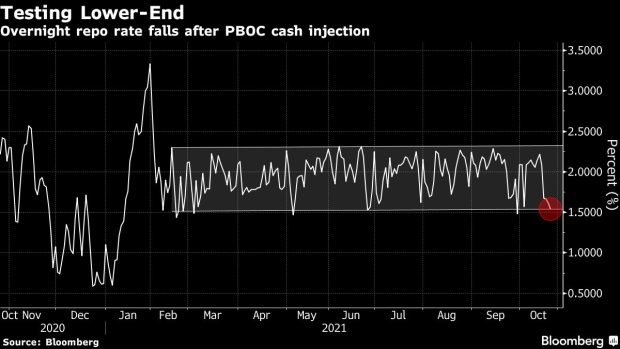Oct 26, 2021
China’s Overnight Repo Rate Slides After PBOC’s Liquidity Boost
, Bloomberg News

(Bloomberg) -- China’s overnight borrowing costs slumped as the central bank continued to add cash to a banking system strained by tax payments, local-government debt issuance and fading monetary easing hopes.
The overnight interbank repo rate dropped as much as eight basis points to 1.53%, the lowest since September 29 and near a nine-month low. The People’s Bank of China injected a net 190 billion yuan ($30 billion) into the financial system via seven-day reverse repurchase agreements for a second straight day Tuesday, which was the biggest single-day addition since January.
“These operations help soothe the market,” said Frances Cheung, rates strategist at Oversea-Chinese Banking Corp in Singapore. “Still, this is short-term money while the liquidity tightness is due to longer-term/permanent payment needs.”
The downside for local rates is limited unless there is a provision of longer-term liquidity, Cheung added
China’s overnight rate is on track to decline for a fifth straight session, a stretch matched by PBOC cash additions. However, the seven-day borrowing rate remains elevated, reflecting liquidity tightness covering the month-end period.
Moreover, regional authorities plan to sell 544 billion yuan of bonds this week, the second-largest weekly issuance in history, according to data compiled by Bloomberg.
Reserve Requirement
The cash injections have dampened hopes of a reduction in banks’ reserve requirement ratios, keeping borrowing costs elevated. That’s because policymakers are seeking to strike a balance between boosting an economy hit by new Covid-19 outbreaks and China Evergrande Group’s debt crisis, and keeping inflation anchored.
“Overall we don’t see excessive liquidity injections beyond the seasonal demand and expect the PBOC to return to a liquidity drain at the beginning of November,” said Liu Peiqian, China economist at Natwest Markets Plc in Singapore.
©2021 Bloomberg L.P.